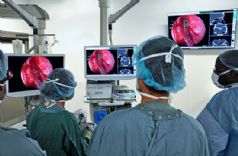Leading-edge technology provides a new and safer approach to otorhinolaryngology surgery

Montreal - New technology using augmented reality and mixed-reality is assisting surgeons with planning and real-time positioning in patients who require ear, nose and throat surgery. The state-of-the-art technology, known as Target Guided Surgery (TGS), aims to improve patient outcomes and safety in this complex surgery, which is performed in close proximity to the optic nerve and the brain. The McGill University Health Centre (MUHC) is the first institution in North America to use augmented and mixed reality in sinus surgery.
TGS integrates seamlessly with the operating room video endoscopy system and provides the clinical team with unique abilities to perform and observe the surgery. The technology, which is created by Berlin-based tech-company Scopis, can also be used in craniofacial, spinal and neurological operations. Scopis chose the MUHC as a centre of reference for TGS because of the institution's expertise in otorhinolaryngology surgery and strong educational focus.
Dr. Marc Tewfik, MUHC director of Rhinology and assistant professor in the department of Otolaryngology at McGill University, performed the first surgery using this unique and highly advanced navigation system. "One of the main benefits of using TGS is the ability to identify critical anatomical structures and to plan the safe placement of surgical instruments," said Dr. Tewfik. "Endoscopic sinus surgery is particularly complex and in addition to improving safety, this technology reduces surgical time."
"Surgical planning, as well as the actual surgery, can be recorded by the Scopis system. This feature turns any operation into educational content that we can use to teach residents," said Dr. Nader Sadeghi, who is chair and chief of the McGill and MUHC departments of Otolaryngology - Head and Neck Surgery. "This technology supports our focus on education and in using innovative solutions for complex medical challenges."
Augmented reality (AR) is a technology that layers computer-generated enhancements on top of existing reality in order to provide additional information and to allow interaction.
Mixed reality is the merging of real and virtual worlds to produce new environments and visualizations where physical and digital objects co-exist and interact in real time.
About the McGill University Health Centre (MUHC): One of the world's foremost academic health centres, the MUHC offers exceptional and integrated patient-centric care, research, teaching and technology assessment. Affiliated with the Faculty of Medicine of McGill University, the MUHC has a mandate to focus on complex care and is highly committed to working with partner organizations within the healthcare network, to ensure to the continuum of care in its community. The partner hospitals of the MUHC - The Montreal Children's Hospital, the Montreal General Hospital, the Royal Victoria Hospital, the Montreal Neurological Hospital, the Montreal Chest Institute and the Lachine Hospital of the MUHC - value multidisciplinary service throughout the lifespan, innovative technologies and practices, strategic partnerships and leadership in knowledge transfer. The MUHC is undergoing a Redevelopment Project at The Neuro, Lachine Hospital, and the Montreal General Hospital, which is designed to provide healthcare professionals with an effective environment in which to ensure patients and their families benefit from The Best Care for Life. Our establishments are also anchored in best sustainable-development practices, including LEED® Gold and BOMA BESt guidelines.